Yes, you read that right. The Pinoy actor, who spoke in Wahan tribe language in the “Arthdal Chronicles” series is not just a talented thespian starring alongside the likes of Jang Dong-gun, Song Joong-ki, Kim Ji-won, and Kim Ok-vin. Ang is a graduate of Korea National University of Arts, where he pursued a master’s in filmmaking under a scholarship.
He has also worked on other dramas previously, such as “The Beauty Inside” and “The Undateables.” The Korea National University of Arts graduate, however, has bigger goals beyond the screen.
As a director and producer of social documentaries, he’s winning awards and joining film festivals with films like “Seoul Mates,” that starred none other than BYH48 member Ji Soo. “After that project, he gained recognition, and is now considered an A-lister. I’m glad that as a Filipino, I contributed to his success in the Korean entertainment industry,” Ang tells Cosmo PH.
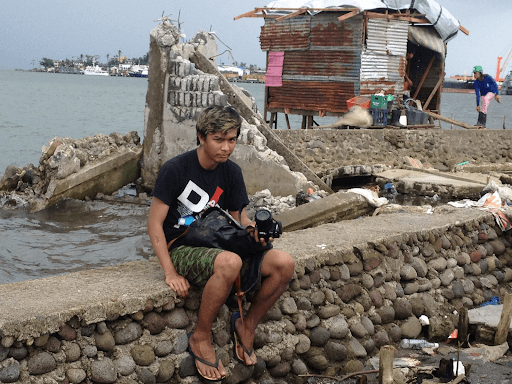
Ang in the midst of the Yolanda typhoon in Leyte while filming “Paraiso” — documentary film. Source: Nash Ang
As an entrepreneur, he developed a mobile app to buy Filipino items in South Korea. As the developer of Pinoy Seoul, he helps Pinoys in South Korea, with a long-term aim of connecting the two countries together.
We caught up with Ang to learn more about his time at the Korea National University of the Arts, his K-drama adventures and his future plans:
When did your love for film begin? Is there a personal backstory behind this?
From visual arts to performing arts, I’ve been a multitasker in this field ever since my childhood. I made my first film “IskWater” (a documentary about the lives of Filipinos who migrated into Manila) and it garnered international recognition.
That made me realise that I excel in filmmaking the most. From then, I focused on a single direction because being a jack of all trades means master of nothing.
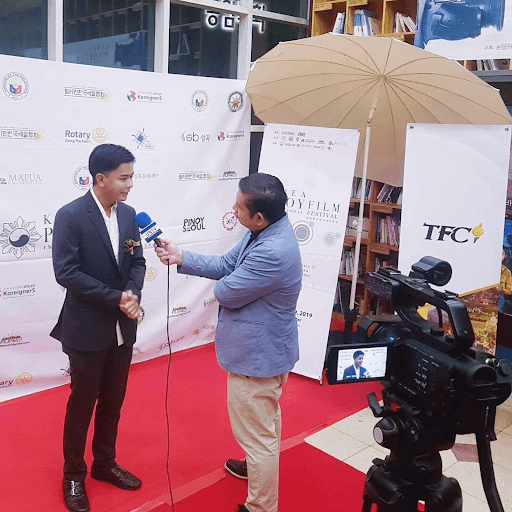
Ang talks at the Korea Pinoy International Film Festival in 2019. Source: Nash Ang
What made you apply to study at the Korea National University of Arts?
When I made my first documentary short film, I was awarded a grant to finish it as a full feature film. It then became “Water Ghetto” (a film about Muslim informal settlers living on a canal at the back of the official residence of the president).
It was officially invited to compete at the DMZ International Film Festival in South Korea. I was encouraged by an acquaintance to apply for the AMA Scholarship Programme offered by the Ministry of Culture which the Korea National University of the Arts is part of.
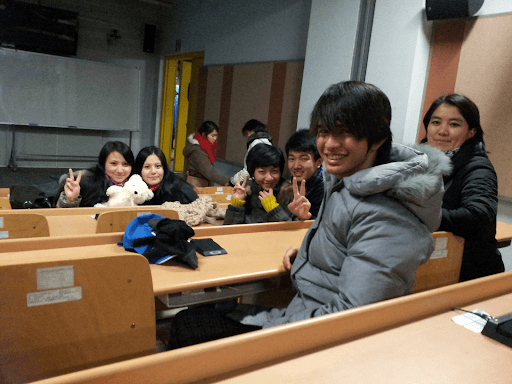
Ang pictured with his classmates at the Korea National University of Arts in 2012. Source: Nash Ang
After a few months, I got notice that I was accepted and flew back.
Would it have made a difference if you studied at a local institution?
South Korea has modern media equipment and also has a keen importance on education which local institutions in my home country lack. Also, there isn’t a programme to get your master’s in filmmaking in the Philippines.
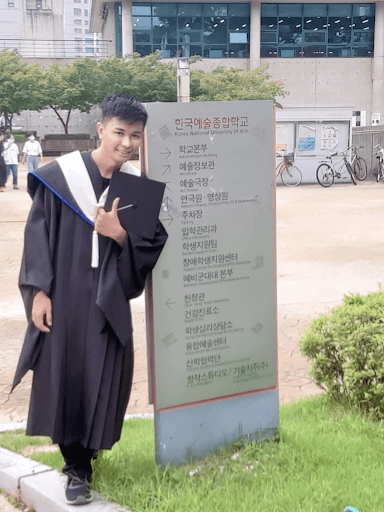
A virtual graduation during pandemic for Ang’s Master’s in Fine Arts and Major in Film Directing from the Korea National University of Arts. Source: Nash Ang
The outcome would be greatly different if I took a similar degree in the Philippines. I grabbed the opportunity without any hesitation.
What skills or knowledge do you wish you had learned more during uni?
Filipinos are known to be resourceful. Combined with the resources which can be found in South Korea, I think I’ve learned and experienced more than I can imagine. I couldn’t ask for more.
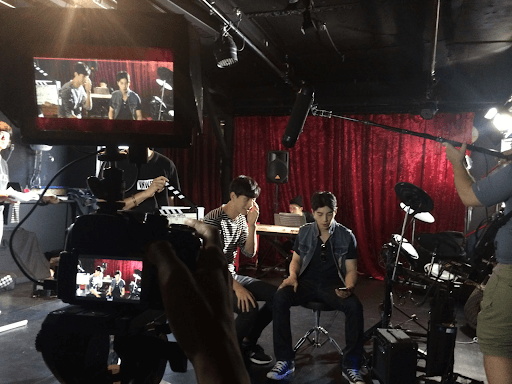
Shot during the first day of shooting of “Seoul Mates” in 2014. The first ever Korea-Philippines feature film. Source: Nash Ang
With an impressive career in acting, filmmaking and Pinoy Seol, what have you been up to since graduating?
Since graduating from the Korea National University of the Arts, I’ve been part of numerous Korean dramas, movies and productions. I founded Pinoy Seoul in 2017, a media portal that provides relevant information about South Korea to Filipinos across the world.
As a film director, I won the grand prize at the ASEAN-Korea Multimedia Competition in 2010 which was held in South korea for my first film. I was also awarded best director at the 13th Pyongyang International Film Festival in North Korea.

An interview on Channel A in South Korea where Ang is talking about his visit to North Korea. Source: Nash Ang
Because of this persistence in upholding Filipino artistic excellence in the international film scene, I’m an awardee of the 2011 and 2016 “Ani ng Dangal” (culture and arts award) for cinema grantee in the Philippines.
I’m also the director of the first Filipino-Korean feature film “Seoul Mates” (a drama romance between a Filipino lady boy and Korean gay man) and the festival director of the first Filipino film festival in South Korea: the Korea Pinoy International Film Festival.
Where does your passion for bridging the gap of social inclusion between the Philippines and South Korea come from?
One of the reasons I stayed in Korea is because of the lack of strong Filipino representation in both Korean entertainment and social entrepreneurship. I founded an online media portal for Filipinos in Korea, made an online “sari-sari” (variety) store — Pinoy Store — and organised a film festival for those reasons.
We are all human beings living on the same planet. I do believe that no one deserves poorer life opportunities because of the way they were born, where they come from or what they believe (a very Miss Universe answer!).
Are there any favourite moments as an actor and filmmaker you can share with us?
My favourite project as an actor would be “Reset” this year, a masterpiece by Choi Jinyoung. This film doesn’t use a single spoken word and has two lead characters which includes me and another Korean actor.
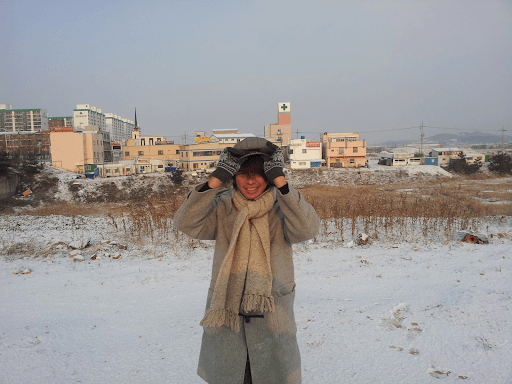
Ang experiencing snow for the first time in 2011. Source: Nash Ang
We communicate through visual wall art and a set of hand-drawn images which makes it so unique. I was cast when the director sent me a message through Instagram and we found out we were actually neighbours in Itaewon.
When we first met, the director discussed his concept and I was instantly hooked with the unorthodox concept. This film is still in the works and has been recorded in the midst of the pandemic.
What advice do you have for international students planning to enrol in the same course as you?
With hard work and dedication, I think anything is possible. Just be optimistic. Failures don’t make us unhappy, our reactions to them do.
These failures can be a challenge for us to become better people. Not only as an aspiring filmmaker but as human beings.
Where do you envision yourself in 10 years?
I just moved to San Francisco in the US. This transition seems like a life reset since I lived in South Korea for a decade as an artist thirsty for new knowledge. These days, I’m learning about entrepreneurship and business innovation in City College of San Francisco.
If I ever have a chance to direct a Korean film, I would like it to be well-financed and without budget constraints. Backed with knowledge I’m currently learning here, I will be more prepared to do a bigger production and may be able to cast famous celebrities.
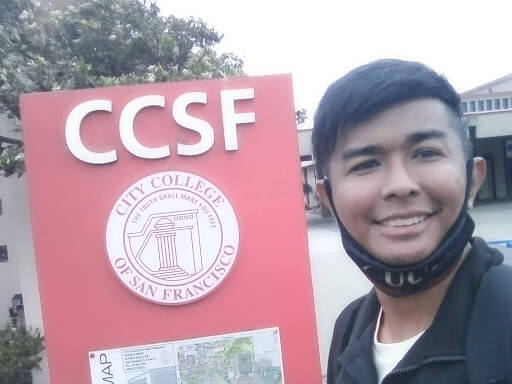
Ang, recently admitted to the City College of San Francisco in the US. Source: Nash Ang
Next, I would like to do a rom-com starring Korean celebrities who are popular in the Philippines such as Sandara Park. I would be in over my head to say that I’m a successful filmmaker.
I always wanted to be a student because being perfect means there is nothing more to learn. There is always something new you can learn in life and these new things are the challenges that make us a better person.
Do you have any tips for students to budget their finances wisely abroad?
My advice is to be resourceful! Being a student abroad is difficult because you have no family to run into, just yourself. So utilise anything around you.
If you’re an introvert, train yourself to socialise. Acquaintances will help you expand the resources you can utilise. As you find ways on how to be comfortable, you will then be less homesick and establish yourself wherever your new home is.




















![[Book Review] The Blade Itself (The First Law Trilogy) by Joe Abercrombie](https://bendthekneegot.com/wp-content/uploads/2018/01/1516047103_maxresdefault-218x150.jpg)
















